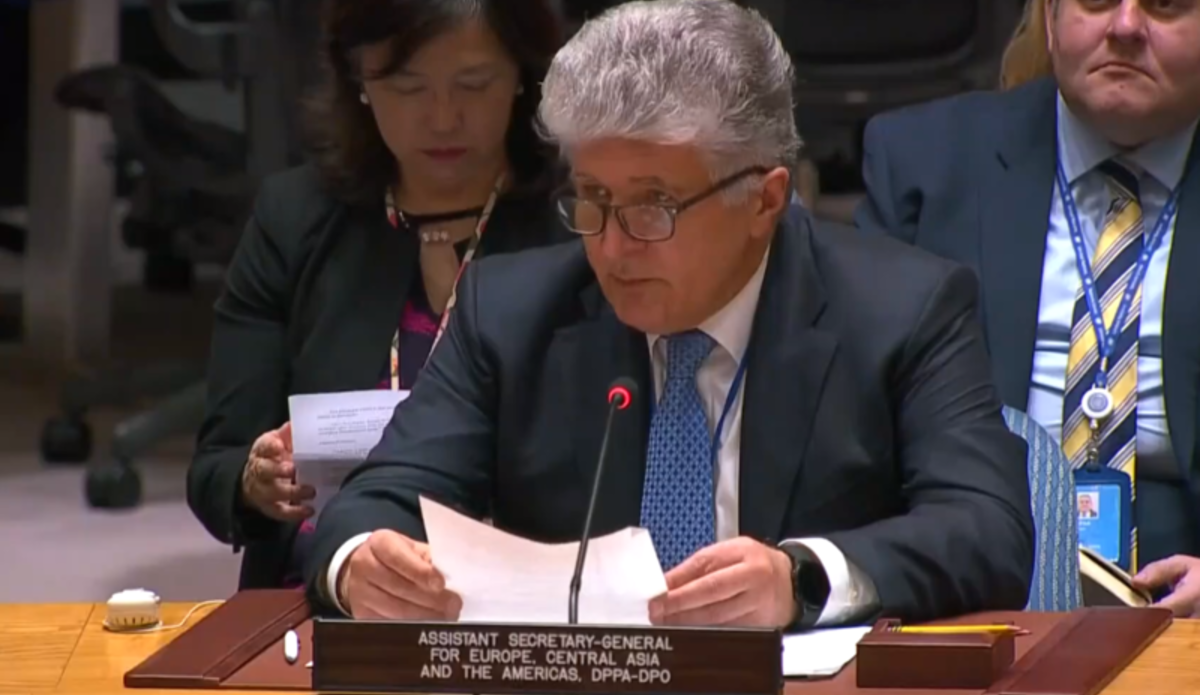ASSISTANT SECRETARY-GENERAL MIROSLAV JENČA’S
REMARKS TO THE SECURITY COUNCIL SESSION
REQUESTED BY ARMENIA
New York, 20 December 2022
Madam President,
Esteemed members of the Council,
I thank you for convening this meeting and for providing the opportunity to brief you on the developments in the South Caucasus, specifically the situation between Armenia and Azerbaijan.
Since my last briefing on 15 September, the situation has remained fragile with the sides regularly trading accusation of ceasefire violation. Nevertheless, despite these sporadic incidents, a glimmer of hope for progress in the ongoing diplomatic efforts has appeared following the renewed violence of mid-September.
We have indeed witnessed several high-level diplomatic initiatives in recent months.
In early October, the Prime Minister of the Republic of Armenia and the President of the Republic of Azerbaijan met in Prague in the margins of the first European Political Community meeting at the invitation of the President of the French Republic and the President of the European Council. The meeting resulted in an agreement to deploy the European Union Monitoring Capacity in Armenia, whose mandate ended yesterday. In this regard, we note the reports that a possible longer term EU mission in Armenia is being envisaged, with the ultimate goal of contributing to sustainable peace in the region.
In late October, the Armenian and Azerbaijani leaders met again in Sochi, hosted by the President of the Russian Federation where they had agreed inter alia to refrain from the use of force or threatening force.
In addition to leader-level talks, several meetings at the Foreign Minister and Deputy Prime Minister levels took place in recent months. For instance, the Armenian and Azerbaijani Foreign Ministers met in New York under the auspices of the US Secretary of State in September. The sides have also been discussing in various forums elements for possible negotiated settlement, including the critical issues of border delimitation and demarcation within the framework of mutual recognition of their territorial integrity and sovereignty.
We commend all these ongoing engagements and mediation efforts and encourage their close coordination to ensure maximum effectiveness.
In addition to the mission by the European Union, agreed by both sides, the Organization for Security and Cooperation in Europe as well as the Collective Security Treaty Organization, at the request of Armenia, also deployed technical missions to Armenia.
The Secretary-General for his part during his bilateral meetings with Prime Minister Pashinyan of Armenia and Foreign Minister Bayramov of Azerbaijan, on the margins of the 77th General Assembly High-Level week, urged progress towards a peaceful settlement. He repeated this message during last week’s meeting with Armenian Foreign Minister Mirzoyan.
The United Nations will continue to remain in close contact with all relevant actors and the concerned parties and stands ready to support the ongoing peace efforts, as needed.
At the invitation of the host governments, the UN Country Teams in Armenia and Azerbaijan also continue to undertake various inter-agency needs and programmatic assessments, including to accessible conflict-impacted areas, as needed.
Madam President,
Regrettably, despite these promising diplomatic engagements, the tensions, both on the Armenia-Azerbaijani border and around areas under the control of the Russian peacekeeping forces have not abated as hoped, with various incidents being reported.
In a latest sign of escalating tensions, on 12 December, reports have emerged of protests near a Russian peacekeeping post on the Lachin road. This road is a vital artery for the people living in the area. It has been reported that these protests were against what they claim is the illegal exploitation of mineral resources and its environmental impact on surrounding area.
The United Nations, which is neither present in the Lachin corridor, nor in the areas under the mandate of the Russian peacekeepers, is not in a position to verify or confirm these various claims and allegations.
We understand that, as we meet, the protests continue.
Over the past days, both Armenia and Azerbaijan have written to the Secretary-General and to the Security Council regarding these recent events, alleging violations of agreed commitments by the other side and challenging each-others’ claims. Both offered widely differing account of the developments and of the situation.
Both sides have accused the other of violating the 9 November 2020 Trilateral Statement signed by the leaders of Armenia, Azerbaijan and the Russia Federation.
Media reports and statements from the Russian peacekeepers in the area indicated that some humanitarian and medical goods and supplies have been able to get through.
It is imperative that the population, particularly those in need be allowed to travel freely and be provided access to basic services. We welcome in this regard the commitment of Russian peacekeeping forces to facilitate and ensure the safe passage through the corridor.
Madam President,
In his 14 December statement, the Secretary-General noted that he was following with concern the ongoing developments around the Lachin corridor.
The Secretary-General urged the sides to de-escalate tensions and to ensure freedom and security of movement along the corridor, in line with the previously reached agreements.
The Secretary-General also reiterated his support to the ongoing mediation efforts in the region.
The UN Country Teams in both Armenia and Azerbaijan continue to maintain open channels with the authorities and stand prepared to respond to emerging humanitarian needs, if requested and as conditions allow.
Madam President,
As we have seen time and time again, most recently this past September, the potential human toll from the resumption of conflict could be considerable. Any renewed conflict would not only impact the people of Armenia and Azerbaijan, but also likely the wider South Caucasus region and beyond. The international community must not let this happen.
The parties must abide by their obligation to fully implement the Trilateral statement on the ceasefire of 9 November 2020 and the subsequent agreed statements and commitments and to redouble their diplomatic efforts to achieve a negotiated lasting peaceful settlement, before it is too late.
Thank you.

